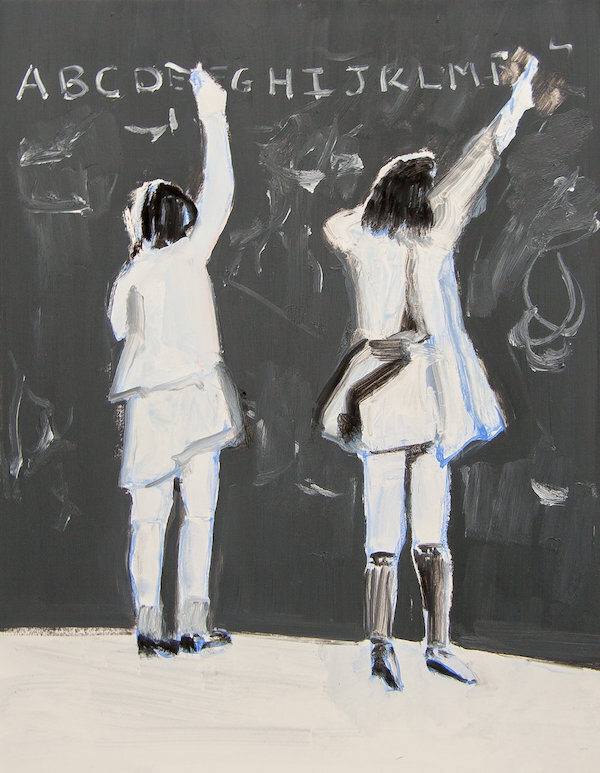Equity Gallery Rebound Series
Preface"The White Problem Redux"
& "3 x 3: Poems to Carry Us Now"
Judith seeking revenge, oil on panel, 2019, 9 x 11 inches
Equity Gallery presented Carla Repice’s The White Problem in 2019 as part of Solos x3, a rotating series of solo exhibitions that allowed Equity member artists to be the sole focal point in their own individual exhibitions.
In The White Problem, Carla Repice probes the effects of racism and dehumanization on the human psyche. She aims to expand and deepen what and how meanings of whiteness are transferred, understood and shared through the language of painting. Using found images online as reference, the paintings stand at a distance from the photographs, but not to the subject matter, witnessing a complex narrative of targets, shields, divisions, violences, and other social forces shaped by Western though. The White Problem points to the exposed underbelly of paranoia, individualism and rage in Trump’s America.
Witnessing the unimaginable, oil on canvas board, 2019, 8 x 10 inches
Carla Repice is a first generation Italian American born to Southern Italian immigrants Post-World War II. She received her MFA in performance art from The School of the Art Institute of Chicago, and studied painting and feminist theory with Rose Shakinovsky and Claire Gavronsky at The Lorenzo de Medici School of Art in Florence, Italy. Repice was the Artistic Director of The Bronx Art Collective, a nationally recognized social justice and visual arts program for high school youth at the DreamYard Art Center in the South Bronx. She is currently the Senior Manager of Education, Engagement & Interpretation at Bard Graduate Center.
The mother, oil on canvas board, 2019, 8 x 10 inches
In this role, Repice directs The Lab for Teen Thinkers, a program designed to train the next generation of creative thinkers to “flip the script” and transform the field of Public Humanities. This summer, teens will research artifacts related to Seneca Village, a 19th century community of predominantly African-Americans, many of whom owned property, in what is now Central Park.
Repice plans to be in her studio in August to paint the media images she has been collecting over the past year. In the meantime you can visit her works on Equity’s Member Gallery here.
All available artwork will have a portion of their sales donated to the Black Visions Collective and The Okra Project.
CLICK HERE TO VISIT THE FULL “THE WHITE PROBLEM REDUX” ONLINE EXHIBITION
Installation Image of "The White Problem” at Coop Gallery
Repice recently exhibited The White Problem at Coop Gallery in Nashville, TN. Coop was established in 2010 similar to Equity Gallery operates as a non profit artist-run project space and curatorial collective. Ronika McClain, a fellow artist and writer in residence at Coop wrote a detailed exploration on the show. You can read the essay on our site for reference.
CLICK HERE TO READ THE ESSAY, “ON CARLA REPICE’S ‘THE WHITE PROBLEM’”
Erase , oil on panel, 2016, 11X14”,
3 x 3: Poems to Carry Us Now
curated by Maya Pindyck
During the original run of The White Problem, the gallery hosted a poetry reading curated by the poet Maya Pindyck. Inspired by the online redux of The White Problem, Pindyck has curated a new poetry series titled "3 x 3: Poems to Carry Us Now" to accompany the exhibition.
This curation of poetry, three poems a week for three weeks, amplifies & spreads the voices of Black poets whose words live in our public domain. Collectively, the poems speak both to the problem of Whiteness and to Black joy, resistance, & hope. They are poems to carry us now, into a different world.
I selected one of Carla’s paintings to go with each group of poems. The paintings I chose speak to the ways Whiteness gets reproduced and naturalized at every level of society. The poems offer distinct voices and perspectives on the same problem, and also an antidote. Together, the poems and paintings do (at least) two things: they confront the violent social structures that create and recreate a white supremacist mindset and they jolt us to respond—laying bare their rage, grief, love, and tenderness, touching us to repair this world and to find some solace in their company. The language of Carla’s paintings joined with the languages of these poems sparks a sisterhood in clear-eyed, antiracist work by way of heart and hand. — Maya Pindyck





